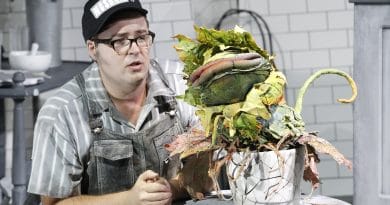The Days and Nights of Beebee Fenstermaker – Factory Theatre
Young Beebee Fenstermaker is brimming with hope and ambition when she makes her move to the big city to pursue her dream career as a writer. However, her lofty ideals are soon served with a swift punch to the gut as she finds difficulty balancing her ‘creative’ work with paying the bills.
The plight of the young creative struggling to balance their ‘everyday’ job with their art is one that has long been rehashed and revisited. And, as evidenced by this staging of William Snyder’s 1963 play, that is because it will never cease to be relevant.
It is really only fitting that The Days and Nights of Beebee Fenstermaker is staged by an ambitious independent theatre company like Phable Productions. Nestled in the shabby-chic Factory Theatre complex, The Fusebox can be a difficult place to bring light and warmth, but under director Candice Storey the Phable team have managed to create a cosy retro 60s apartment – complete with vintage pop music humming throughout the room as the audience takes their seats.
The play begins rather light, and you could easily assume this sitcom-like tone would continue for the whole show. Beebee (Chantelle Von Appen) flounces into her new apartment, arms loaded with boxes as she sets up her new dwelling; her friendly new neighbour Nettie Jo (portrayed with vacant sweetness by Bronte Sparrow), another young woman, helps to unstack books.
Beebee assertively (if naively) announces that she plans to make a living on writing novels alone and to meet a man to fall deeply in love with for the rest of her life. However, things predictably take a turn when three months later she finds herself desperate enough to take a medial office job while her novel writing attempts are stalled.
If you were to go into this play expecting a light and entirely predictable coming-of-age story about a determined young woman finding her feet, you’d be mistaken. Over two and a half hours, Chantelle Von Appen transforms our lead from bright-eyed and ambitious to weary and defeated – we see her age before us.
Seated along the back of the stage are the remainder of the cast of this seven-hander, lined up like patients waiting in a doctor’s office. This arrangement has the potential to be distracting but it manages to come across as whimsical. Perhaps their presence on stage represents their constant presence in Beebee’s mind – the pressure of her family’s expectations (personified by her mother and aunts); the potential of men she is yet to meet? In a way the characters mirror the audience as they nod and silently laugh along.
In addition to Beebee’s story, we also follow her mother Melinda (Eileen Camilleri) as she navigates her relationships with her sisters Virginia (Lauren Orrell) and Betty (Helen Stuart) as they await their elderly mother’s impending death. Beebee’s apartment becomes Melinda’s home as this sub-plot interjects, a staging choice which, again, is not as disorienting as it would seem.
The best chemistry on stage was undoubtedly between Beebee and live-in boyfriend Ed Busby (Ryan Michael Madden) their plucky dialogue and quirks give the show some much needed buoyancy amidst its tendency towards the laborious. Following their playful and affectionate beginnings, the devastating breakdown of their relationship is raw and unflinching, Von Appen and Madden are nerve-strikingly convincing in the eruption of their final great fight.
While costuming in this production is not extravagant (nor need it be) the rotation of Beebee’s outfits is cleverly used to flag the different personal states in her journey. From the flowing dress and scarf she wears in the first act, through to a muted grey corporate-style dress, and eventually nothing but a black slip as she bashes about in the squalor her apartment becomes by the final scenes.
For the most part, The Days and Nights of Beebee Fenstermaker ponders through relationships and how we conduct them – whether with family, friends or lovers. So it is curious when this play abruptly wraps up with Beebee meeting and presumably ending up with Bob Smith (portrayed with unassuming boyish charm by Jack Berry) in the final act – with the main drawcard for Beebee apparently being that it’s nice how they can ‘stand each other’?
This play touches on the most bittersweet realities of the human condition – with a greater feminist sensibility than one may expect from a male playwright working in the 60’s. But after riding along with the ups and downs of Beebee and the women of her family (and there are more ‘downs’ than ‘ups’), you may find yourself asking, ‘Why?’
Ultimately, the reason for this play is to remind us that we are not alone. That misery may be overwhelming at times, that we may not always conduct ourselves the best we could, but ultimately life will go on, and inspiration will always eventually present itself.





